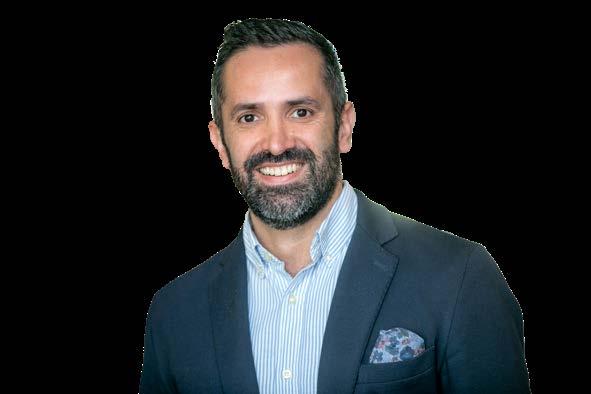
8 minute read
IMPACT BEYOND THE NUMBERS
Interview with Emanuele Fanelli & Stephanie Mooij
In order to truly get under the skin of impact investing, asset managers cannot simply rely on third party ratings or even regulatory disclosures. Impact investment strategies, which aim to generate competitive financial returns alongside positive environmental or social impact, require combining quantitative data with in-depth qualitative analysis. Although third-party ESG or sustainability data and company disclosures can provide a helpful starting point, it is necessary for asset managers to conduct their own proprietary assessment to truly understand the activities driving a company’s business and the impact said activities have on society and the environment.
“There is a great deal of scepticism towards ESG funds which are labelled as “impact” investments. And rightfully so as they run the risk of simply being a tickthe-box exercise. It can be challenging to capture the real picture of impact and sustainability given data inconsistency, incomparability, opaqueness and lack of disclosure by companies. Moreover, reported data is often not verified. For this reason, we are wary of overly positive impact reports. A pleasant report by a company is not enough to show that their commitment to sustainability is real,” stresses Emanuele Fanelli, senior Responsible Investment Manager at Aegon Asset Management.
In addition, when looking to quantify the impact a company is having, solely focusing on revenues aligned with environmental or social causes is not enough. Although a revenue alignment assessment can be helpful, impact investing requires going beyond the headline numbers. Stephanie Mooij senior engagement associate at Aegon Asset Management explains: “Sometimes the revenues give a completely distorted picture of what’s really going on within a company. For example, Comcast, a US internet supplier, provides lower income families with internet at cost. They make no profit from this. So, although the revenue from this activity is very low, the positive social impact potential is very high. This illustrates why has asset managers must conduct a comprehensive assessment that includes quantitative and qualitative aspects when evaluating a company’s impact potential.”
Revenues and third-party ratings are the first port of call when analysing companies targeted for potential investment. Within the investing framework for the ABN AMRO Aegon Global Equity Impact Fund , Fanelli, Mooij and their colleagues consider the products and services a company produces or makes. Next, they categorise them as positive, neutral or detrimental in terms of impact. This helps produce a net impact figure.
However, Mooij emphasises the importance of qualitative analysis being done over and above these calculations, to truly capture the impact a company’s activity is having: “If we only look at the data, we face certain obstacles which we are trying to overcome by providing comprehensive qualitative impact analysis. We combine several different sources of information in a very detailed fundamental exercise to draw up a robust impact analysis of the company in question.”
In addition to external data, company reports and revenue alignment, Aegon AM references the UN Sustainable Development Goals (SDGs) and tries to align its selection to them where possible and realistic. This approach is applied to their equity impact and sustainability-themed investment frameworks. However, the firm is aware of the challenges inherent in this practice and the SDGs as considered to be guiding principles more than a strict investment code. Fanelli outlines: “When you look at the SDGs in detail, their focus is on emerging and less developed markets, communities and economies; aiming to

support parts of society which have been forgotten and underserved. We try to transpose that vision into investing in large, listed companies which in some cases are trying to offer services to these parts of society. However, this is not always possible as those activities can, at times, not be profitable. We also aim to invest in companies which will capitalise on the transition to a low carbon and more inclusive economy.”
When making investment decisions for the ABN AMRO Aegon Global Equity Impact Fund, the team’s findings are then challenged by the impact fund committee, which includes an independent member, in line with best-practice. The meetings of this committee are where the analysis can be contested and biases can be challenged, thus strengthening the investment and impact thesis.
A progressive and pragmatic approach This rigorous process is evidence of Aegon’s commitment to responsible investing. The firm’s comprehensive three-pillar approach includes full integration of ESG across its investment platform, leading active ownership activities and developing focused responsible investment solutions. The firm’s flagship strategies in this space are the Global Sustainable Equity Fund and the ABN AMRO Aegon Global Equity Impact fund which form part of Aegon’s ESG/ Impact portfolio With the support of a 14-person strong Responsible Investment, the firm has developed many proprietary frameworks to assess ESG factors and sustainability criteria, which can aid in the development of focused responsible investment solutions such as exclusionary, best-in-class ESG, sustainability-themed and impact investments.
The firm provides mandatory ESG training to analysts and has done so since 2013. “It’s about instituting a culture shift and educating analysts to expand their horizons and start including ESG in their analysis of their own accord.
“ESG is as important as other fundamental factors when evaluating investments. Ignoring ESG factors can prove to be very expensive as these risks can erode company fundamentals and affect valuations if they become unmanageable. For example, if a company has a toxic culture, then that can be very costly. Treating employees badly typically means they are less productive, or they leave and you need to re-hire and re-train new staff,” notes Mooij.
And education is also something Aegon is also doing with clients. Fanelli comments: “Sometimes clients will ask us to go further and to be more impactful. They want to see the real-world impact and change in dynamics. As an asset manager with deep responsible investing experience, our role is to educate clients on the realities of impact investing, including the constraints. In our opinion, the key to impact investing is using a pragmatic approach and developing realistic expectations with clients.” Impact investing within public equities Although impact investing has been growing in popularity, investors have traditionally been limited to private markets with few public equity or fixed income options available in the marketplace. This is now changing as firms like Aegon AM are developing progressive solutions to bring impact investing to a wider investor base.
Recently the firm recently developed a Global Impact Equity product in collaboration with ABN AMRO. The product relies on a comprehensive framework that combines qualitative and quantitative information, including external and internal insights, to identify and engage with companies that provide measurable positive impact, an attractive risk-reward profile and attractive financial return potential.
This progressive solution hit a sweet spot, according to Mooij, as qualified investors can pursue positive impact alongside a financial return. She goes on to underscore the importance of having an active approach to impact investing: “There is no fundamental research done in passive funds. They are based on third-party ratings which are in turn built on how well companies fill out questionnaires. Investors are coming to realise the importance of having that fundamental research and active management piece of the puzzle.” n
Emanuele Fanelli Senior Responsible Investment Manager
Emanuele joined Aegon Asset Management in 2016, working with portfolio managers and credit analysts in the different Aegon Asset Management geographies to integrate ESG in investment decision making and ESG products development. He is currently chairing the Aegon Asset Management Fixed Income Sustainable Investment Committee, he is a member of the Aegon NV Climate Change Working Group, ABN AMRO Aegon Impact Equity Fund Committee, and a member of the Investment Leaders Group Working Group of the Cambridge Institute for Sustainability Leadership. Before his current role, Emanuele was a Senior Vice President at CDP (Carbon Disclosure Project) supporting institutional investors in factoring environmental externalities in their investment analysis, engagement activities and ESG products development. Additionally, Emanuele worked at Bloomberg as an Equity Specialist and at KPMG as Environmental Consultant. Emanuele studied international business and finance at Bocconi University, Norwegian School of Economics and ITAM and he has a MSc in General Management and a CEMS MiM in International Management.
Stephanie Mooij Senior Engagement Specialist
Stephanie Mooij, PhD joined Aegon AM in 2019. She is a Senior Engagement Associate in the Responsible Investment team, and joined Aegon AM after finishing her PhD in Responsible Investment at Oxford University. She researched the ESG rating and ranking industry and the obstacles to responsible investment in the investment chain in the United Kingdom, the Netherlands and Germany. Prior to her PhD, Stephanie was an Equity Analyst at equity manager Ownership Capital. Stephanie holds an MSc in Finance and Investments, honours and cum laude, from Erasmus University Rotterdam and a PhD in Responsible Investment from Oxford University.

Developing alternative investments globally, implementing them sustainably
LGT Capital Partners Ltd. is a leading alternative investment specialist that has had a strong focus on ESG for many years. Since 2003, many of our investment programs have had a responsible investment clause written into their governing documents. In 2008, we became an early signatory to the Principles for Responsible Investment (PRI), and 2018, one of the firm’s managing partners, Tycho Sneyers, joined the board of directors of PRI. LGT Capital Partners Ltd. manages over USD 70 billion for more than 550 institutional clients in 40 countries. Headquartered in Pfaeffikon (SZ), Switzerland, the firm has offices in New York, Dublin, London, Paris, Frankfurt, Vaduz, Dubai, Beijing, Hong Kong, Tokyo and Sydney.



